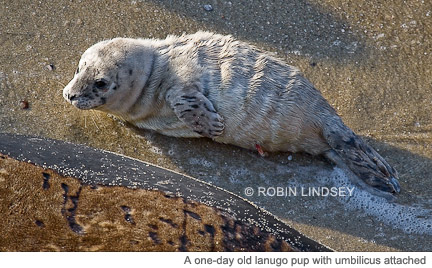Jul 2010
Pupdate: where the heck are they?
Jul/31/10 08:57 AM
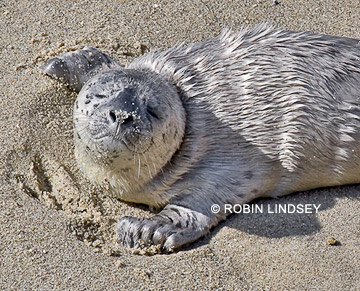
Since both pups and adult seals follow the food source it is hard to say when they might arrive. They could fool us and be a little early this year based on so much activity in the south end. So, keep your binoculars handy when you’re out walking the beaches. And don’t forget to give Seal Sitters’ dispatch a call if you spot a pup.
Seal Sitters talks to kids about seal pups
Jul/28/10 07:09 AM
Volunteers from Seal Sitters visited Alki Kids Place yesterday and spoke to the children about seals and seal pups. A very attentive and inquisitive group of kids saw photos and learned about the rookeries where pups are born and nursed for 4-6 weeks. They learned that it is normal for pups to come ashore to rest and warm up and that people should let them do so undisturbed. The children who participate in this summer program walk to nearby Constellation Park on Beach Drive almost every day. Now, they will be on the lookout for the pups that should be arriving soon. Every year, harbor seal pups come ashore on this popular beach - unfortunately, too, where dogs are often illegally off-leash. Dogs are a danger to these extremely vulnerable young seals - and dogs can catch diseases from them as well. These children know that if they see a seal pup, they should keep people and dogs away and call Seal Sitters. Many thanks to Cheryl and the kids at Alki Kids Place! Contact Seal Sitters if you’d like us to speak to your group.
Boaters endanger newborn seal pups at haul out sites
Jul/18/10 08:09 PM
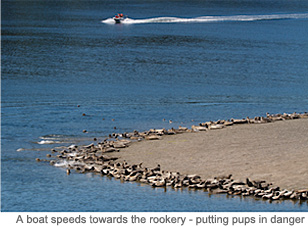
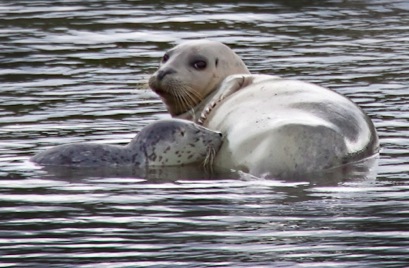
Seal talk at Highline Community College Marine Science Center
Jul/14/10 07:41 PM
“There’s a seal on my beach. What do I do?” Adrianne Akmajian, Marine Mammal Research and Stranding Intern with the Washington Department of Fish and Wildlife, will talk about seal pups this Saturday. Come learn what to do when a seal lands on your beach and what local researchers do in response. There will be a slideshow of the birth of a seal pup. The talk will be held Saturday, July 17, 12:00-12:45 pm. Admission is free. Highline Community College MaST Center is located near the Redondo Beach Park.
Gray whale strands on Tulalip Reservation
Jul/11/10 08:02 AM
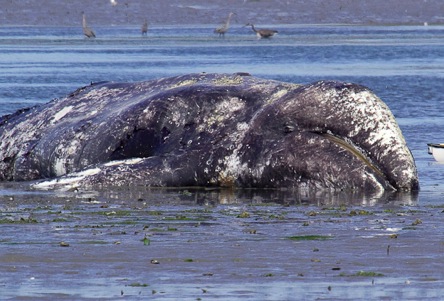
The Everett gray whale stranded yesterday in Tulalip Bay on the Tulalip Reservation. Members of Seal Sitters, Sno-King Marine Mammal Stranding Network and WDFW responded to the scene. The mud flats of the bay restricted access to the whale which lay exposed to the extreme sun and heat. As the tide came in, however, the Tulalip Bay Fire Department zodiac managed to get a pump close enough to keep the whale wet and cool. A borrowed canoe allowed a stranding team member to get sheets to the scene so the whale could be covered and more protected. The tide finally covered the whale about 2pm. The Tulalip tribes honored the whale and prayed for him to get well. The repeated stranding behavior of this adult whale is indicative that he is most likely dying. The gray was spotted by NOAA on Saturday at 4:30 at Spee-Bi-Dah heading north into Port Susan. See related gallery of photos.
UPDATE:
7/13/10 Transient orcas were seen attacking the gray whale yesterday afternoon (Monday). Related story and video.
7/12/10 The gray was spotted this morning (Monday) at 6:30 am heading east toward Camano Island.
Gray whale strands in Everett
Jul/09/10 05:29 PM
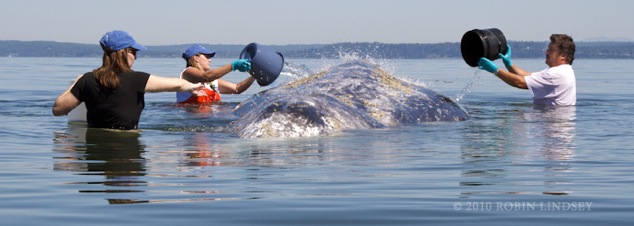
Yesterday, however, the whale was marooned on the beach at low tide. Concerned neighbors in shorts and swimsuits assisted in keeping the exposed whale wet and cool. However, as the water rose and the whale became more active it became too dangerous for them to continue to help. Members of the NW Stranding Network (above photo from left, Jessie Huggins of Cascadia Research, Kristin Wilkinson of NOAA, and Brian Chittick of Snohomish-King County Stranding Network) labored for hours pouring buckets of water over the whale - until finally the incoming tide created a water level deep enough that he could swim free. They then boarded a boat with a team from WDFW Marine Mammal Investigations and monitored the whale until 2pm when he finally left the shallower waters and headed out into the strait.
Early this morning the whale stranded again and the Stranding Network responded. Approximately 2:30 this afternoon he was in 7-10 feet of water as the tide came in. NOAA is not optimistic about the whale’s survival based on his behavior and weakened condition.
Pupping season has begun - don't touch seal pups!
Jul/03/10 08:28 PM
